Nine To Noon for Wednesday 8 November 2023
09:05 Councils plead for clarity on water infrastructure reform
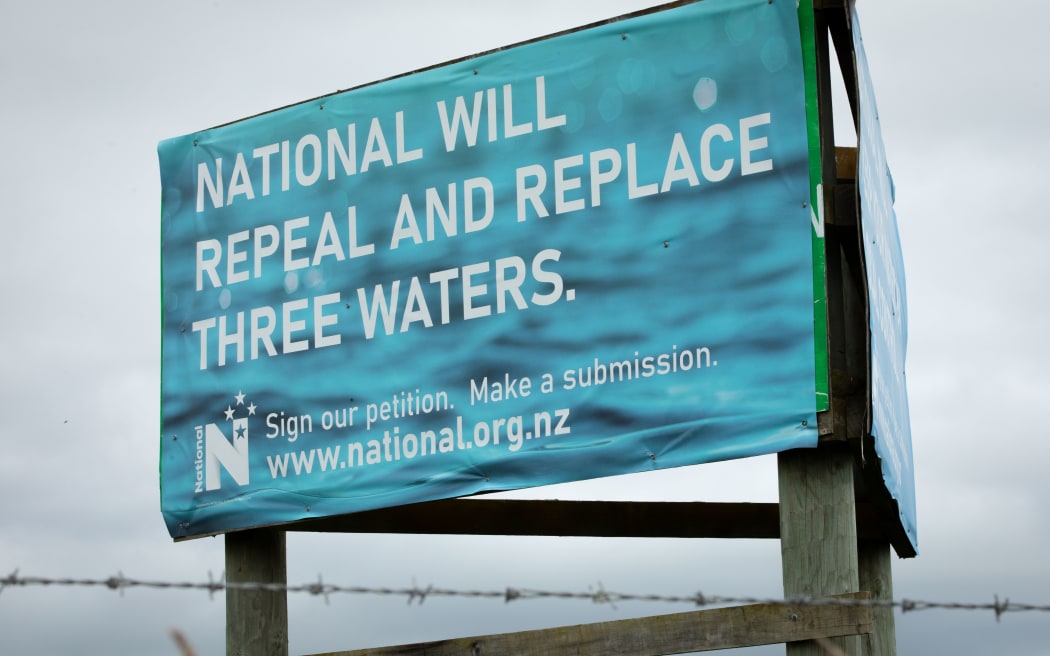
Photo: RNZ / Angus Dreaver
A new government is still to be formed, but councils around the country are urgently wanting direction on what will happen with new policy on water infrastructure. Wellington Water estimates it would take a billion dollars a year, for the next 10 years, to fully deal with its beleaguered infrastructure. The former Labour Government had planned for $140b to $180b worth of spending on three waters - that's drinking, storm and wastewater - renewal over the next three decades. The funds would have been raised by borrowing, by 10 new water entities taking control of council infrastructure around the country. But the parties now negotiating a coalition deal to become the government have pledged to scrap that. National's plan is for councils to form their new entities among themselves, to raise funds for the work. It remains one of the most challenging components of many councils financial planning. Tonia Haskell is acting chief executive of Wellington Water - the company owned by six councils in the wider Wellington region. Neil Holdom is Mayor of New Plymouth, and provincial chair of Local Government NZ. And Alex Walker is LGNZ's rural chair. All three speak with Kathryn Ryan.
09:30 Genetically modified banana brings hope to industry as extinction fears loom
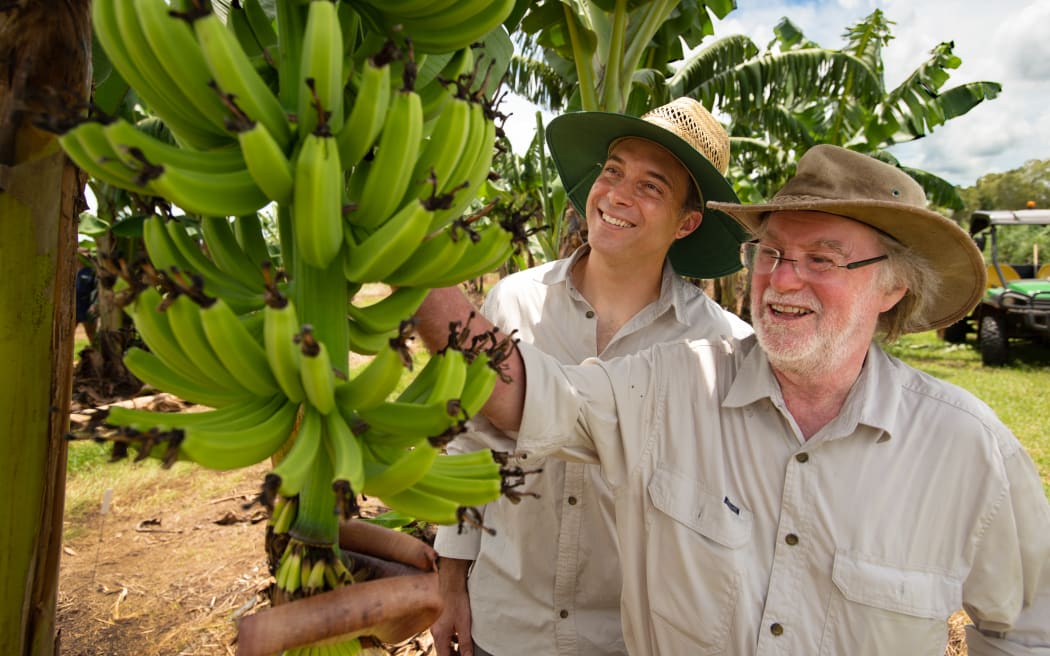
Dr Jean-Yves Paul, left, and QUT Distinguished Professor James Dale, right, with a bunch of QCAV-4 bananas, at the trial site in the Northern Territory. Photo: Anthony Weate
A genetically modified banana which has been engineered to resist disease is offering a glimmer of hope to the increasingly strained industry. There's been a considerable outbreak of Panama disease recently, a fungus which decimates banana plants. In the 1950s, it wiped out the Gros Michel banana, which was replaced with the one we now know and love: the Cavendish. Back then, the Cavendish was immune to Panama, but a new fungal strain - known as tropical race 4 - means that's not the case anymore. Across the ditch, scientists have been working on a genetically modified, disease-resistant type of Cavendish banana - and it's now been submitted for regulatory approval to the Australian Government. If it gets the green light, it'll be the first genetically-modified banana approved anywhere in the world - though it wouldn't immediately be rolled out for human consumption. Distinguished Professor James Dale of Queensland University of Technology has been working on it for the better part of three decades, and he speaks to Kathryn Ryan from Queensland.
09:45 Australia: PM's China visit, interest rates, pub crash, Melbourne Cup
Australia correspondent Karen Middleton joins Kathryn to look at how Prime Minister Anthony Albanese has fared on his visit to China and relationship with President Xi Jinping. She'll talk about the latest interest rate moves and implications for the economy, the horror crash in a Victoria tourist town that left five people dead and whether the Melbourne Cup hype is still what it once was.
Karen Middleton is chief political correspondent for The Saturday Paper.
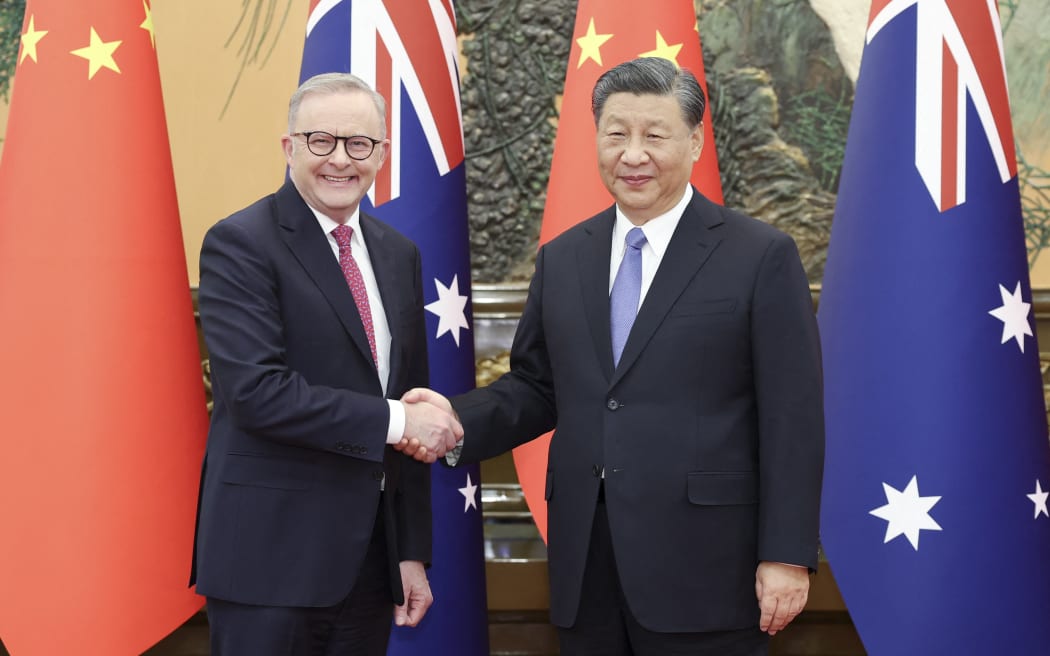
Chinese President Xi Jinping meets Australian Prime Minister Anthony Albanese in Beijing on 6 November. Photo: DING HAITAO
10:05 The Three Pensioneers who took on Te Araroa
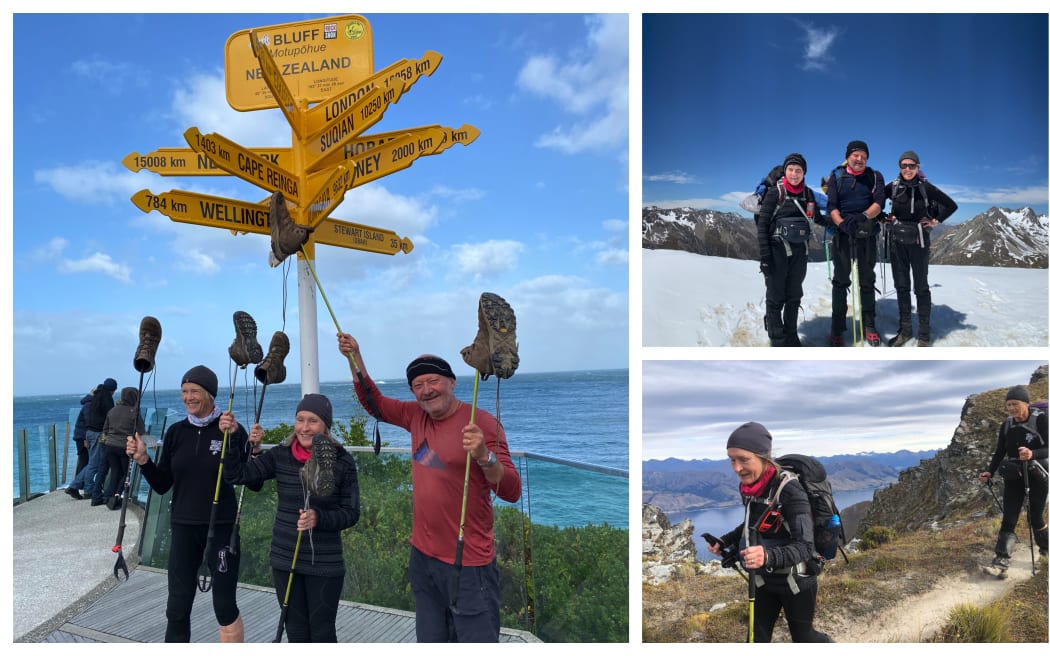
Photo: supplied
They call themselves the 'Three Pensioneers': former newspaper Editor Tim Pankhurst, his wife Sue and former Wellington mayor Dame Kerry Prendergast teamed up to walk the length of the country on Te Araroa. Over two summers following the covid lockdowns they achieved their goal, encountering flooded rivers, snow and ice, serious injury and some pretty hefty mental challenges to reach Bluff. Tim's book about their journey Every Effing Inch: Fear and Loathing on Aotearoa New Zealand's long trail - the 3021km Te Araroa - is being launched tonight in Wellington.
10:35 Book review: Water by John Boyne
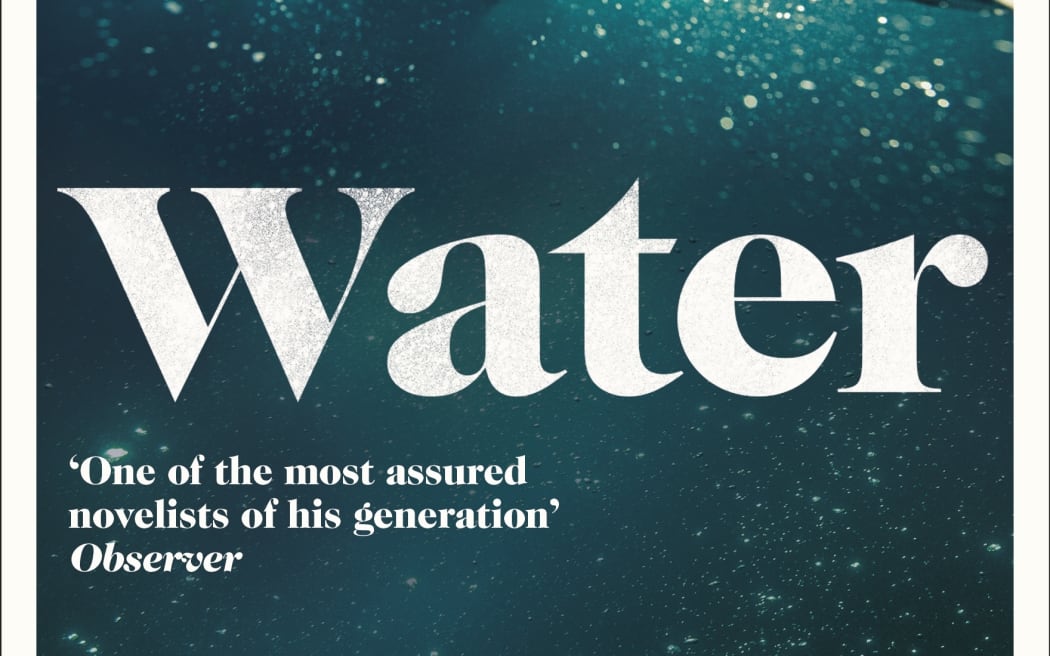
Photo: Penguin Random House
Kim Pittar from Muir's Independent Bookshop Gisborne reviews Water by John Boyne published by Penguin Random House NZ
10:45 Around the motu: Chris Hyde in Napier
It's called simply the One Stop Kai Shop Convenience Store, but for the 250 people of Raupunga and passers-through it is the first store in a decade in the State Highway 2 town which is 82km from Napier with 35km from Wairoa. Chris says he's heard the hangi and pāua pies are a huge hit. Also Chris talks to Kathryn about the people building makeshift driftwood huts on the beach off Marine Parade in Napier. And a 40 year labour of love, John Timpson's incredible Havelock North garden is now being open to the public.
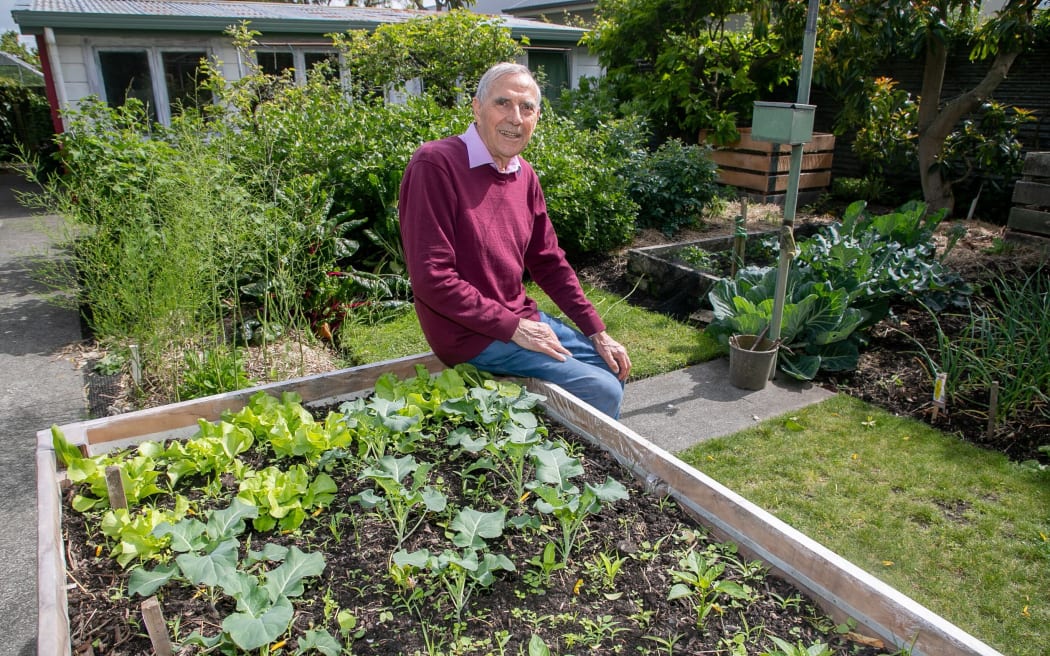
Photo: Warren Buckland
Hawkes Bay Today editor Chris Hyde
11:05 Artists re-recording their music: Taylor Swift is not the first to do it

Photo: Supplied
It's been a big year for Taylor Swift - she's become a billionaire, and this week her latest release 1989 (Taylor's Version) became the fastest-selling vinyl record since the statistic was first tracked in 1991. So why do artists re-release their songs? Music commentator Dave Wilson joins Kathryn to talk about the phenomenon and play examples of some tracks that were re-recorded - sometimes with decades in between. What are the subtle, or not so subtle differences? (Sorry Swifties, no Tay Tay today).
Dave Wilson is musician, composer, and ethnomusicologist, a senior lecturer at the New Zealand School of Music at Victoria University of Wellington
11:25 A son's tribute to his father : the legacy of cartoonist Murray Ball
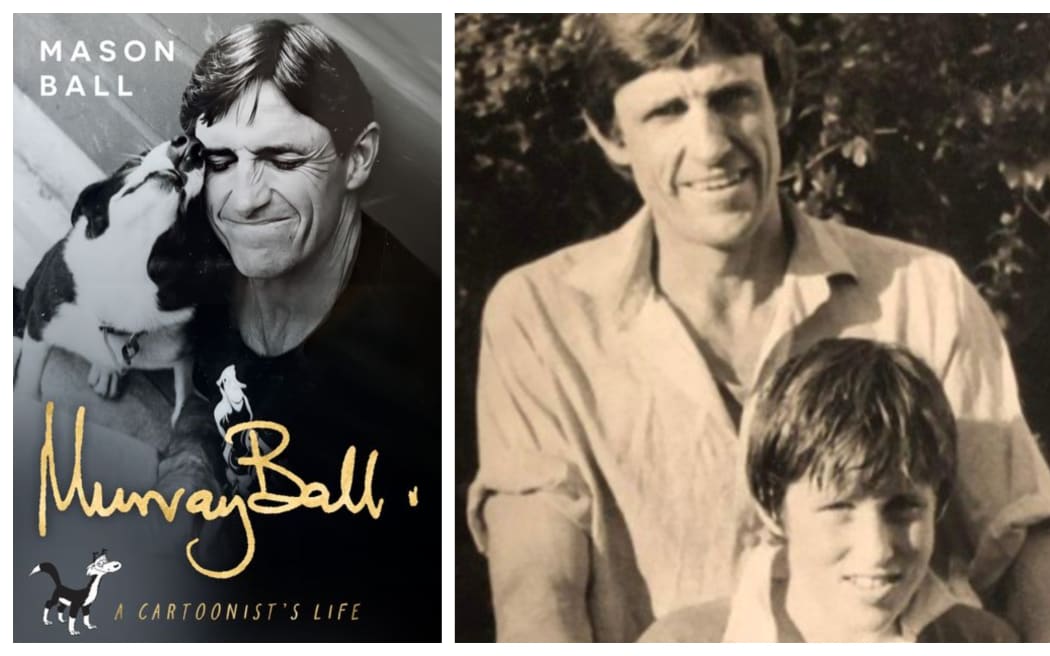
Murray and Mason Ball Photo: supplied by Harper Collins NZ
The late Murray Ball, created Footrot Flats and other iconic New Zealand characters in his comic strip which first appeared in the Evening Post. Murray passed away in 2017, and his son Mason has written the first biography about him - Murray Ball - A Cartoonist's Life. In the preface to the book - Mason Ball writes: Knowing him as a son, I hoped to do him a service, albeit posthumously, by gathering up the memories before time washed them away. Seared into New Zealand cartoon history are the Football Flats comic strip characters - essentially a black singleted farmer, Wal and his dog - Dog! But over almost 20 years other characters were developed, a stage play was based on the cartoon, and an animated feature film.
11:45 Personal finance: Things to think about before embarking on a side hustle

Photo: 123RF
If you're considering a side hustle - a way of making a little extra cash - what are some of the things you need to consider? Money expert Simran Kaur talks about having a plan, being patient and considering how much it might cost to try to generate some additional income.
Simran Kaur is the co-host of the podcast Girls That Invest. This discussion is of a general nature, and does not constitute financial advice.






